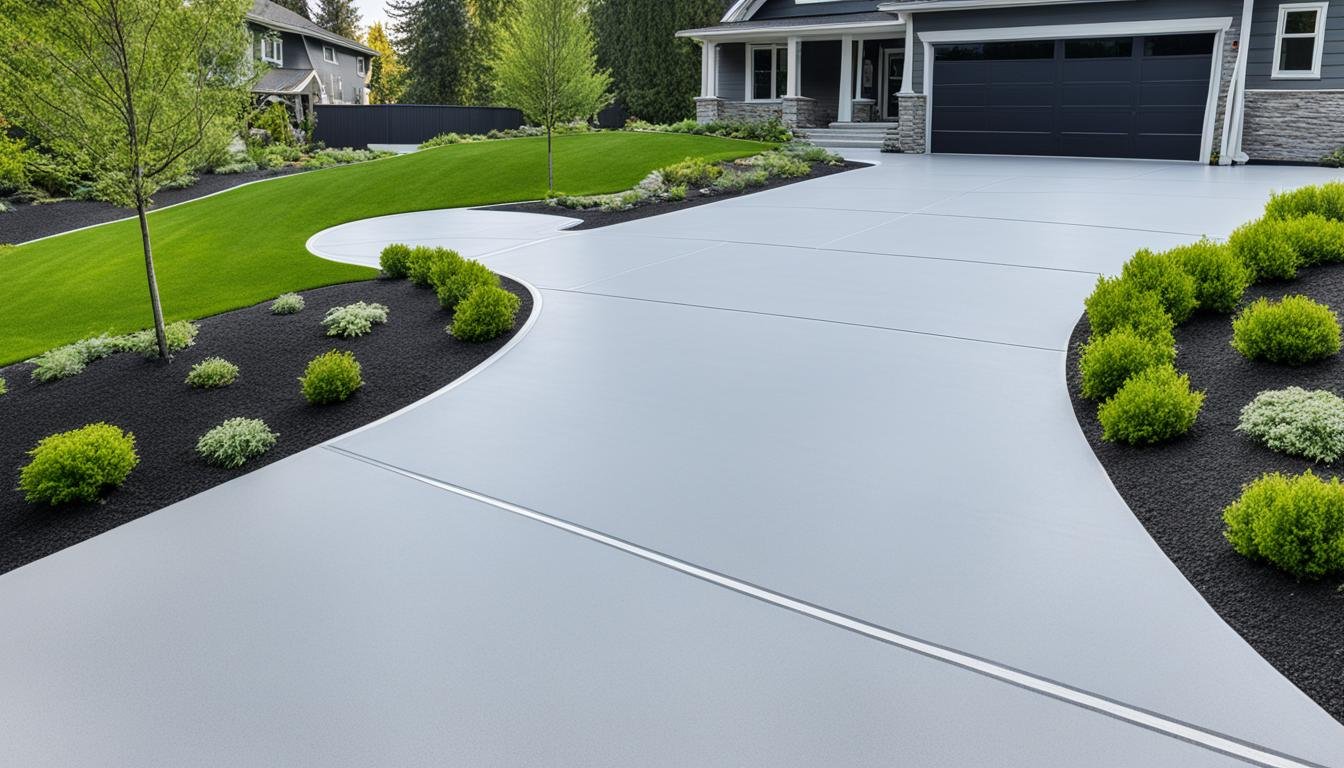How Does a Concrete Driveway Compare to Asphalt in Durability?

When it comes to choosing the right material for your driveway, durability is a key factor to consider. A well-built driveway not only enhances the overall appearance of your property but also withstands the test of time and everyday wear and tear. Among the popular options available, concrete and asphalt driveways are often top contenders.
Concrete driveways have long been praised for their durability and longevity. Known for their strength, they can bear heavy loads without significant damage. Whether it’s the weight of multiple vehicles or harsh weather conditions, concrete driveways have proven their ability to stand the test of time.
On the other hand, asphalt driveways offer their own advantages. They are known for their flexibility, which allows them to withstand frequent freezing and thawing cycles without cracking. Asphalt driveways are also easier and cheaper to repair compared to concrete driveways, making them a popular choice among homeowners.
In the following sections, we will delve deeper into the factors that affect the durability of concrete driveways and provide a comprehensive comparison between concrete and asphalt driveways. By the end, you will have a better understanding of which material is best suited for your specific needs.
So, let’s dive in and explore the durability of concrete and asphalt driveways!
Factors Affecting the Durability of Concrete Driveways
When it comes to the durability of concrete driveways, several factors play a crucial role in determining their longevity and performance. By understanding these factors, homeowners can make informed decisions regarding the construction and maintenance of their concrete driveways, ensuring they stand the test of time.
Quality of Materials
The quality of materials used in constructing a concrete driveway is a key factor in its durability. High-quality cement, aggregates, and reinforcements contribute to a driveway’s ability to withstand heavy loads, harsh weather conditions, and everyday wear and tear. By utilizing premium materials, homeowners can enhance the overall strength and longevity of their driveways.
Construction Techniques
The construction techniques employed during the installation of a concrete driveway also impact its durability. Proper grading and excavation, appropriate compaction, and precise concrete pouring are essential for creating a stable and long-lasting driveway. By adhering to industry best practices, homeowners can ensure that their driveways can withstand the test of time.
Thickness of the Concrete
The thickness of the concrete layer plays a significant role in the durability of a driveway. A thicker layer provides greater strength and resistance to cracking and crumbling. However, it’s important to note that the thickness requirements may vary depending on the expected usage and load-bearing capacity of the driveway. Consulting with a professional contractor can help determine the ideal thickness for a concrete driveway.
Proper Maintenance Practices
Maintaining a concrete driveway is crucial for its long-term durability. Regular cleaning, sealing, and addressing any cracks or potholes promptly can minimize the potential for further damage. Additionally, avoiding the use of harsh chemical deicers and taking precautions to prevent oil spills or stains can help preserve the strength and appearance of the driveway.
“By understanding and addressing these factors affecting the durability of concrete driveways, homeowners can ensure that their investment lasts for years to come.”
| Factors | Impact on Durability |
|---|---|
| Quality of Materials | High-quality materials contribute to enhanced strength and longevity. |
| Construction Techniques | Proper construction techniques create a stable and long-lasting driveway. |
| Thickness of the Concrete | A thicker concrete layer provides greater resistance to cracking and crumbling. |
| Proper Maintenance Practices | Regular cleaning, sealing, and addressing issues promptly can prevent further damage. |
Comparing Concrete and Asphalt Driveways
When it comes to choosing a suitable material for your driveway, it’s crucial to consider factors such as durability, resistance to weather elements, cracking and pothole formation, maintenance requirements, and overall lifespan. In this section, we will conduct a comprehensive comparison of concrete and asphalt driveways, helping you make an informed decision based on your specific needs.
Durability
Durability is a key consideration for any driveway, as it needs to withstand heavy loads and daily usage. While both concrete and asphalt driveways offer reasonable durability, concrete is known for its exceptional strength and longevity. Concrete driveways can typically last up to 30 years or more, making them an excellent long-term investment.
On the other hand, asphalt driveways have a shorter lifespan, usually ranging from 15 to 20 years. They are more prone to cracking and require regular maintenance to ensure their durability over time.
Resistance to Weather Elements
Both concrete and asphalt driveways are exposed to various weather conditions, including extreme heat, freezing temperatures, and moisture. Concrete driveways have a higher resistance to these elements, making them more suitable for areas with harsh climates. Concrete can handle temperature fluctuations without significant damage, maintaining its structural integrity.
While asphalt driveways can withstand moderate weather conditions, they are more susceptible to damage caused by freezing and thawing cycles. This leads to cracks and pothole formation, requiring timely repairs and maintenance.
Maintenance Requirements
Maintenance plays a vital role in preserving the durability of driveways. Concrete driveways generally require less maintenance compared to asphalt driveways. Regular sealing of concrete surfaces helps prevent staining and extends their lifespan. Additionally, concrete driveways are less susceptible to oil and gas stains, making them easier to clean.
On the other hand, asphalt driveways require periodic sealcoating and reapplication of asphalt emulsion to maintain their appearance and performance. They are more prone to oil and gas stains, which can leave lasting discoloration if not addressed promptly.
Lifespan
Considering the durability, resistance to weather elements, and maintenance requirements, concrete driveways tend to have a longer lifespan compared to asphalt driveways. Concrete driveways can last up to three decades, while asphalt driveways typically have a lifespan of 15 to 20 years.
Overall, if longevity is a top priority for you, investing in a concrete driveway is a wise choice. However, it’s essential to evaluate your specific needs and budget before making a decision.
| Concrete Driveway | Asphalt Driveway | |
|---|---|---|
| Durability | High | Moderate |
| Resistance to Weather Elements | Excellent | Good |
| Maintenance Requirements | Low | High |
| Lifespan | 30 years or more | 15 to 20 years |
Conclusion
After comparing the durability of concrete and asphalt driveways, it is clear that concrete driveways offer superior longevity and endurance.
Concrete driveways are known for their ability to withstand heavy loads and resist cracking and pothole formation. The sturdy composition of concrete makes it highly durable, ensuring that it can withstand the daily wear and tear of vehicle traffic.
Additionally, concrete driveways exhibit excellent resistance to extreme temperatures, making them suitable for various climates. Whether it is scorching heat or freezing cold, concrete driveways maintain their structural integrity, reducing the need for frequent repairs or replacements.
Furthermore, concrete driveways require minimal maintenance compared to their asphalt counterparts. Regular sealing and occasional cleaning can significantly extend their lifespan, providing homeowners with long-term cost savings and peace of mind.
When homeowners choose to install a concrete driveway, they are investing in a durable, long-lasting solution that enhances the value and aesthetics of their properties.
FAQ
How does a concrete driveway compare to asphalt in durability?
Concrete driveways are known for their exceptional durability, often outperforming asphalt driveways in terms of longevity. While both materials have their own merits, concrete driveways are generally more resistant to cracking, UV damage, and heavy vehicle loads, making them a popular choice for homeowners seeking a robust and long-lasting driveway option.
What factors affect the durability of concrete driveways?
Several factors contribute to the durability of concrete driveways. The quality of materials used during construction, including the concrete mix and reinforcement, plays a crucial role. Additionally, proper construction techniques, adequate thickness of the concrete, and regular maintenance practices, such as sealing and addressing cracks, are essential for maximizing the lifespan of a concrete driveway.
How do concrete and asphalt driveways compare?
When comparing concrete and asphalt driveways, it’s important to consider various aspects. Concrete driveways have the advantage of superior durability, with better resistance to cracking and pothole formation. They also tend to require less maintenance over time. However, asphalt driveways often have a lower initial cost and can be easier to repair. Ultimately, the choice between the two materials depends on the homeowner’s priorities and budget.
What are the key benefits of concrete driveways in terms of longevity?
Concrete driveways are renowned for their long-lasting nature. They can withstand heavy loads, making them suitable for both personal and commercial use. Concrete is highly resistant to extreme temperatures, such as freezing and thawing cycles, which can cause cracking in asphalt driveways. Moreover, proper maintenance practices, such as sealing, can extend the lifespan of a concrete driveway even further.
